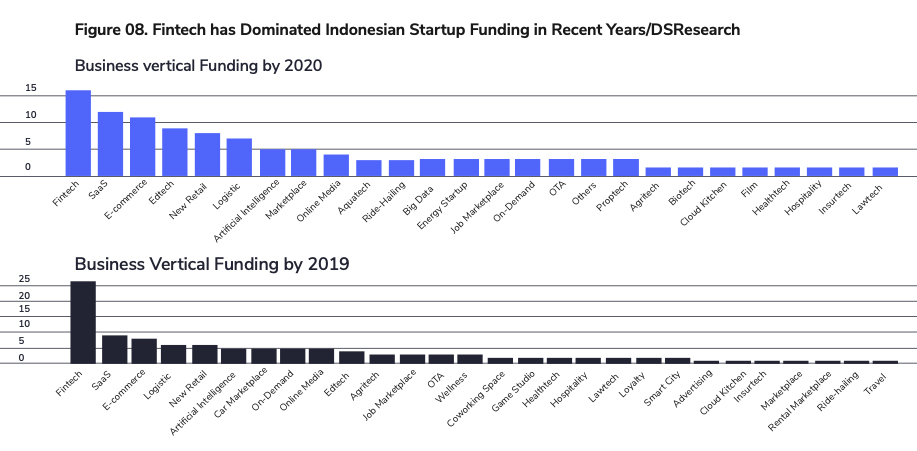Fintech Talks: The Reasons Behind Thinking This Industry Is "Boring"
The increasing number of fintech startups in Indonesia is indeed encouraging, but some observers see that the startup industry is becoming more homogeneous and less creative
Talk about industry financial technology (fintech) in Indonesia, it seems that one of the first things that will come to mind is that this industry is in the middle booming. If you visited our site as of March 8, 2021 yesterday, the latest news coming from fintech players dominates the front page, such as news about (again) latest funding, announcement service update from the “red plate” electronic money platform, news milestone from one of the P2P players lending, to the presentation of a typical editorial opinion about the potential of the fintech business in the bill payment.
The presence of the fintech industry in the country can be said to be crucial in supporting the acceleration of the growth of the digital startup ecosystem. Its role is believed to be able to boost the business of startup players, starting from facilitating payment services, converting cash transactions to non-cash, to opening up financial access for business owners. unbanked society which is still common in Indonesia. Such a role makes the fintech industry full of potential.
Behind a theory there must be an anti-theory. Likewise in the fintech industry. Behind its power to disrupt the conventional financial industry, lies the notion that "fintech is boring".
DailySocial.id, via DSResearch, late last year released the fintech industry annual report in Indonesia. In the report there are facts of extraordinary positive achievements amid economic uncertainty amid the pandemic. Then how can fintech be considered boring? What factors can make this happen?
In a casual talk session at the Clubhouse on March 5, 2021, we invited well-known startup founders and investors such as Ryu Kawano Suliawan (Head of Merchants Gojek & midtrans Founder), Antonny Liem (Investment Partner GDP Ventures), Alfatih Timur (Co-Founder & CEO We can), Pamitra Wineka (Co-Founder & President TaniHub), and Aria Rajasa Masna (CTO KaryaKarsa) to try to answer these questions.

"If we look at the system, regulations, and so on, it's only natural that fintech is considered boring, because fintech is like that. There are processes that tend to be tedious behind their roles that make it easier for startups and market players,” said Antonny, opening the discussion.
From the point of view of experienced fintech players in the payment gateway, instead of being boring, Ryu actually warned that the current fintech industry would meet a moment Bubble when the finance industry is seen as a sexy business field.
“Whenever the era, when the industry Finance considered sexy, phenomenon Bubble [in the financial industry] it might happen like in the 80s, 90s, to 2000," he said.
The above assumption does not necessarily mean that fintech is a fragile industry. The tedious process has actually formed a fintech industry that is relied upon to jointly accelerate the digital startup ecosystem in Indonesia.
Aria said that the availability of fintech services was very much needed, even though the business that was carried out did not directly intersect with the fintech business.
“I think fintech can be said to be like infrastructure for an ecosystem. Its existence must be built first to move the industry. This is proven in KaryaKarsa. The existence of fintech really helps accelerate us. For example, with the current e-wallet service. Five years ago we still stream with the manual transfer method,” explained Aria.
The response above is one of the reasons why fintech is thriving in Indonesia. According to data compiled by the Fintech Report 2020, fintech services that serve the lending sector, both for productive and consumptive needs, currently have 152 players with a total loan distribution of 128,7 trillion rupiah. No wonder the fintech industry is currently booming with the constant arrival of new players. However, what really makes Indonesia seen as an attractive market?

"Maybe we can start from the fact that Indonesia is one of the countries that has net interest margin (NIM) is the largest in the world. It can be said that NIM in Indonesia is phenomenal. I myself am not sure that a country with the same size as Indonesia can have a large NIM,” said Ryu.
In line with Ryu, Pamitra Wineka, who is familiarly called Eka, has her own view of why fintech still has huge potential, even though its existence is felt to be saturated. As founder one of the platforms agritech He believes that the real potential of the fintech market is in an area far from the city center. As long as the infrastructure is well built.
“We have a huge market potential for fintech business, but infrastructure is the key. Because if we look at it now, the big players in e-wallet, such as GoPay, Ovo, LinkAja, seem to be just busy competing in the marketplace. market which is actually small, namely only in big cities. Even though what we know is that the huge market potential is in rural areas. The fact that we found, the potential in that area is very large, but most of them are still transacting through cash. Well it becomes potential if we can convert them to e-wallet services and the like,” he said.
Alfatih, who is familiarly called Timmy, agrees with this assumption. An important figure behind the presence of the Kitabisa social platform said that the existence of fintech could provide solutions for the platform he founded.
"For me, fintech is important. See habitdonating driven by emotional factors rather than needs, we see payment issues turned out to be quite crucial. If the process is not good, untrusted, making donors reluctant. Initially we only had interbank transfer facilities with unique codes which were quite difficult. When we implement e-money service, it is very helpful and donors like it," said Timmy.
Indonesia is one of the countries that has net interest margin (NIM) is the largest in the world. It can be said that NIM in Indonesia is phenomenal. I myself am not sure that a country with the same size as Indonesia can have a large NIM
Ryu Sulliawan Head of Merchants Gojek & Midtrans Founder
By implementing fintech services, he admitted to finding two interesting things. First, fintech opens up possibilities for micro-donation which pushed the number of transactions to increase significantly. The second interesting thing, according to him, is that the implementation of fintech is able to give birth to a new segment of the Kitabisa platform. Electronic money services are able to invite the younger generation to become philanthropists because of the ease of the process of making donations.
Seeing fintech innovations that are developing in such a way, then is it still relevant if we think fintech is boring?
“I think fintech will be boring if we only focus on building infrastructure in big cities, without focusing on developing services in villages, rural areas, and so on,” explained Eka.
Eka's opinion is a warning to the fintech industry about new potential markets that must be the focus of innovation.
Then how should the fintech industry move forward? Both Ryu, Antonny, Aria, Timmy, and Eka agreed that the future fate of the fintech industry depends on the support of various parties.
"In my opinion, in order not to be boring, fintech also needs support. Like the e-commerce industry, for example, they also needed support from fintech so that the ecosystem is more mature. Likewise in fintech, support What is needed can come from infrastructure support, government regulations, and so on,” concluded Eka.
After a long discussion, I came to the conclusion that maybe fintech should be stable and be misunderstood as “boring”. Fintech is an infrastructure, the foundation where many creative services of various types can focus on delivering value to their users, without having to worry about taking care of things such as payments, consolidation, capital provision. And like infrastructure, fintech must be stable. It may look boring at first glance, but for me, the potential for fintech in the future is very open, very broad, and very uplifting.
Sign up for our
newsletter
